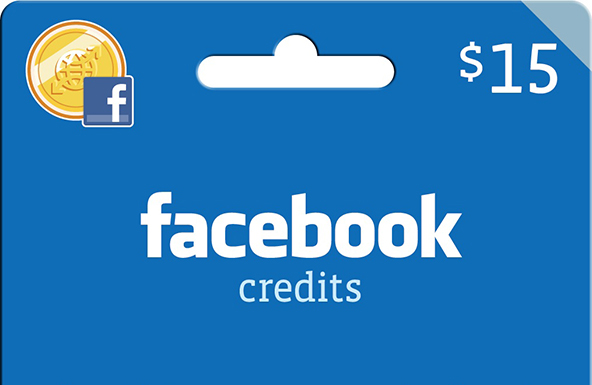Facebook Credits Will not Replace Credit Cards, but Will Challenge Payment Processors

Rumors about the imminent demise of credit cards and their replacement with a more up-to-date payment form have circulated at regular intervals for a very long time, only to inevitably prove greatly exaggerated at the end. The rise of social media over the course of the past several years has contributed its fair share to the rumor factory and, unsurprisingly, Facebook has been the name mentioned most often.
BTN’s Sean Sposito is giving us the outlines of the plot that he says may lead to the displacement of credit and debit cards by Facebook Credits — the social network’s currency that is used for the purchasing of an array of digital items that can be used for various purposes within Facebook’s domain. It’s an interesting story that makes for great reading, but unfortunately it is also one that is replete with errors, which shouldn’t be made by someone writing for a publication with the name of “American Banker.” More importantly, once again credit cards will survive the challenge, although payment processing companies may find themselves competing in a new environment and will be forced to find ways to adjust.
Facebook Credits
The social network introduced its digital currency in 2009 to be used for payment in some Facebook games and Zynga, the creator of FarmVille and top developer of Facebook applications, quickly made the credits, which sell at $0.10 apiece, the exclusive payment method for most of its games. That is big business in its own right, which, together with the credits’ other uses, accounts for a substantial chunk of the social network’s revenues. As Sposito reminds us:
Facebook generated about $557 million, or roughly 15% of its revenues, from “payments and other fees” last year. That figure is a five-fold increase from its $106 million in payments revenues in 2010, which was itself up from the $13 million the year before.
And there is no doubt that the growth will continue, as Facebook finds other uses for its currency. One of these uses is very likely to be a checkout method at online and physical stores, but here is where Sposito treads on shaky ground.
Facebook Credits vs. Credit Cards
So Sposito commits a fallacy that many have fallen into before him and, I have no doubt, many others will be repeating for a long time to come. He misplaces the credit cards’ position in the transaction process. Here is the gist of his argument:
Facebook could also become a prominent brand on checkout pages and eventually at the point of sale, further displacing credit and debit cards.
No, Facebook will not displace credit and debit cards, as these payment methods will be used for the purchasing of a large share of the social network’s credits. In other words, in the payment process the bank cards come before the credits.
Sposito goes on to compare, correctly, the putative future Facebook payment platform to PayPal, but he again draws the wrong conclusions:
PayPal was acquired by eBay Inc. in 2002 and had its initial success among merchants who used the online auction site. PayPal later aggressively went after business with traditional retailers. It recently began testing a point of sale payment system that invades the home turf of traditional credit card issuers.
While the first two sentences are correct, the third one is completely wrong. Neither online, nor at physical checkouts, does PayPal compete directly with the card issuers. As is the case with the hypothetical Facebook scenario above, PayPal transactions, whether virtual or physical, are merely facilitated by eBay’s payment outfit. The payments, however, are made with bank cards or checking accounts. So how is PayPal displacing the issuers? It does not, it promotes them.
So PayPal is a payment processor and as such it competes with other payment processors, not the issuers. Ditto with Facebook.
The Takeaway
Just as PayPal did a decade ago and Square is doing at present, Facebook’s foray into the payment processing world will force changes in how things are done in our industry. But these changes will be different from what Sposito and many others envisage. They will have nothing to do with the card issuers, although the latter will still have plenty to worry about. The ones who will have to adapt to the new reality are the payment processors. And, as always, it will only be the fittest who will survive.
Image credit: Industrygamers.com.



Barclays?ÇÖ Pingit app and Payment Council Database: only tip of iceberg of possibilities
The news from the Payments Council and Barclays?ÇÖ Mobile Payments Service launch certainly created some noise in the market and is a wake-up call for the UK banking community ?Çô yet it is also just the tip of the iceberg of what can be done.
With the UK?ÇÖs mobile payments services lagging behind many markets, the launch by Barclays is a real step forward as it enables the sending of money by phone to any registered person irrespective of whom they bank with. Luup welcomes the Barclays launch, which is a wake-up call for their competitors. It creates the need for them to re-vitalise their strategies and realise the potential of a truly mobile payments system.
Yet it is also worth recognising that the industry is still only looking at the tip of the iceberg of what can be done. For example, for some years now, Luup has been providing corporate mobile payment services for banks. This enables them to offer their corporate customers services such as mobile invoice presentments, authorisations and payments and bring significant efficiencies and real savings to the cash-conscious corporate. They also provide banks with access to new sources of liquidity and customers.
On the retail banking side, solutions already used in the Middle East have fewer constraints than the Barclays offering. The Barclays?ÇÖ UK solution is available to smart phone users; there is no SMS service and it serves only P2P, Account to Account payments. Luup services on the other hand do not rely on smart phone apps but also operate using SMS and where no internet is available, enabling far greater reach to a wider range of users. Other services available are bill payments, money transfers for cash-out at ATMs and international remittances in any language and in any currency. These are the kind of services that UK banks could be providing to their customers.
Our aim is to create a payments network across borders and encourage all banks and other partners to co-operate in an open, agnostic system based on a universally deployable platform. We strongly believe that this is the only way to encourage global and mass take up of mobile payments.
Martin Wilson, CEO of mobile payments provider Luup
We believe the future of finance will be based on Facebook, Twitter, Google+ and Linkedin. The finance industry is nearing its Napster moment. Money represents a special type of information, an informational unit called trust.
Why will we need payment processors when we can crowd-source creditworthiness?
As I have said before, Information wants to be Free, Money wants to flow Freely: urgentspeed.com/2011/07/information-wants-to-be-free-money-wants-to-flow-freely.html
At my Start-up, Lenddo.com we are we are using the social graph to improve people?ÇÖs lives and restructure finance. Members are using their online reputation to prove identity and access credit in regions where there is little access to credit. Every day members are able to get education for loved ones, medicine for family members, and shelter for relatives. Tangible life improvements. We expect to impact millions.
Why will you need a credit card issuer, when your online identity becomes a de facto, globally accepted FICO score? Through crowd-sourced scoring, credit will naturally flow to those that are trustworthy.
Jeff,
Your comment is more of a manifesto, but you are making some valid points. I agree that the finance industry is changing and, as our article points out, Facebook does play a role in the process. But I think that the day when our online identities will replace our FICO scores is still some way off.